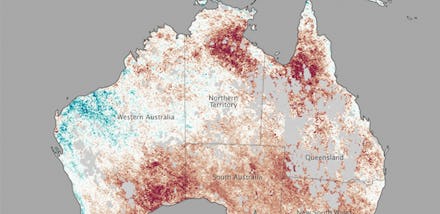Australia Saw an Anomaly That Should Occur Once in 12,300 Years. Here's Why It Happened

When it comes to climate change, the human race just can't seem to do anything right.
A new report from Australia's Climate Council, a nonprofit group that aims to provide independent information on climate change to the country's residents, has some sobering news for more or less everyone on the planet: Australia's record hot year in 2013 was "virtually impossible" without the influence of climate change.
Using climate model simulations, researchers were able to calculate likely temperatures in a "natural-only" environment — the earth's climate without the effects of man-made greenhouse gases. They found that in the absence of human influence on the climate, the staggering temperatures Australia experienced in 2013 had a likelihood of happening just once in 12,300 years — a mere .008% chance.
The numbers don't lie. The warmest months of 2012-2013 — summer in Australia stretches from December to February — were unimaginably hot, and a single heatwave in January 2013 helped make that year the hottest on record. The short span "was notable for the extent, with records set in every state and territory, and the nationally averaged daily temperature rose to levels never previously observed, and did this for an extended period," according to Australia's Bureau of Meteorology.
As Chris Mooney at the Washington Post noted, the records were notable for their extremes: Forty-four different locations across the country set all-time high temperature records, and the heat lasted for weeks. Things got so bad, in fact, that the Bureau of Meteorology was forced to add new colors — pink and purple — to its temperature map just to keep up.
These record temperatures were almost certainly our fault. Though there's a very slim chance that these record temperatures would have happened anyway (the "once" in the "once-in-12,300 years" stat), man-made climate change is almost definitely the culprit.
Will Steffen, the Climate Council report's author and the head of the Climate Change Institute at the Australian National University, summed it up best in a conversation with the Guardian: "I mean, no one would bet on odds of 1 in nearly 13,000."
According to the report, climate change made the frequency of heat waves like those in January 2013 three times as likely and doubled the probability that they would reach the intense highs they did.
The figures we have on climate change tell a similar story. The evidence from the Climate Council's report is damning, but it's not necessarily surprising. It's simply the latest in a pile of sobering reports to prove that climate change is very real, and very much a result of our own actions.
As the Intergovernmental Panel on Climate Change warns, "Scientific evidence for warming of the climate system is unequivocal." Lest you may think that such warming is somehow natural, consider the fact that 97% of climate scientists agree that climate-warming trends are a result of human action.
"Scientific evidence for warming of the climate system is unequivocal."
Everything from rising global temperatures in the last 50 years to rapidly melting ice sheets tells us as much: According to NASA, "Most of this warming has occurred since the 1970s, with the 20 warmest years having occurred since 1981 and with all 10 of the warmest years occurring in the past 12 years." The effects also are undeniable — destructive weather events like Hurricane Sandy have been linked to climate change, and vulnerable animal populations like walruses are seeing the damage.
Despite this overwhelming evidence, a terrifying number of world leaders still refuse to see the light. Australian Prime Minister Tony Abbott once asserted that "coal [was] good for humanity," and 56% of Republicans in the newly elected 114th Congress are dubious of the science involved in climate change, according to the Center for American Progress.
Have fun living in that 129-degree weather, guys.
h/t Washington Post
Editor's Note: Feb. 13, 2015
Due to an attribution error in the editing process, an earlier version of this article cited and linked to NASA, but did not include quotations around the phrases "Most of the increases in global temperature have occurred since the 1970s," and "with all 10 of the warmest years on record occurring in the last 12 years." The story has been updated to fully attribute NASA's language.